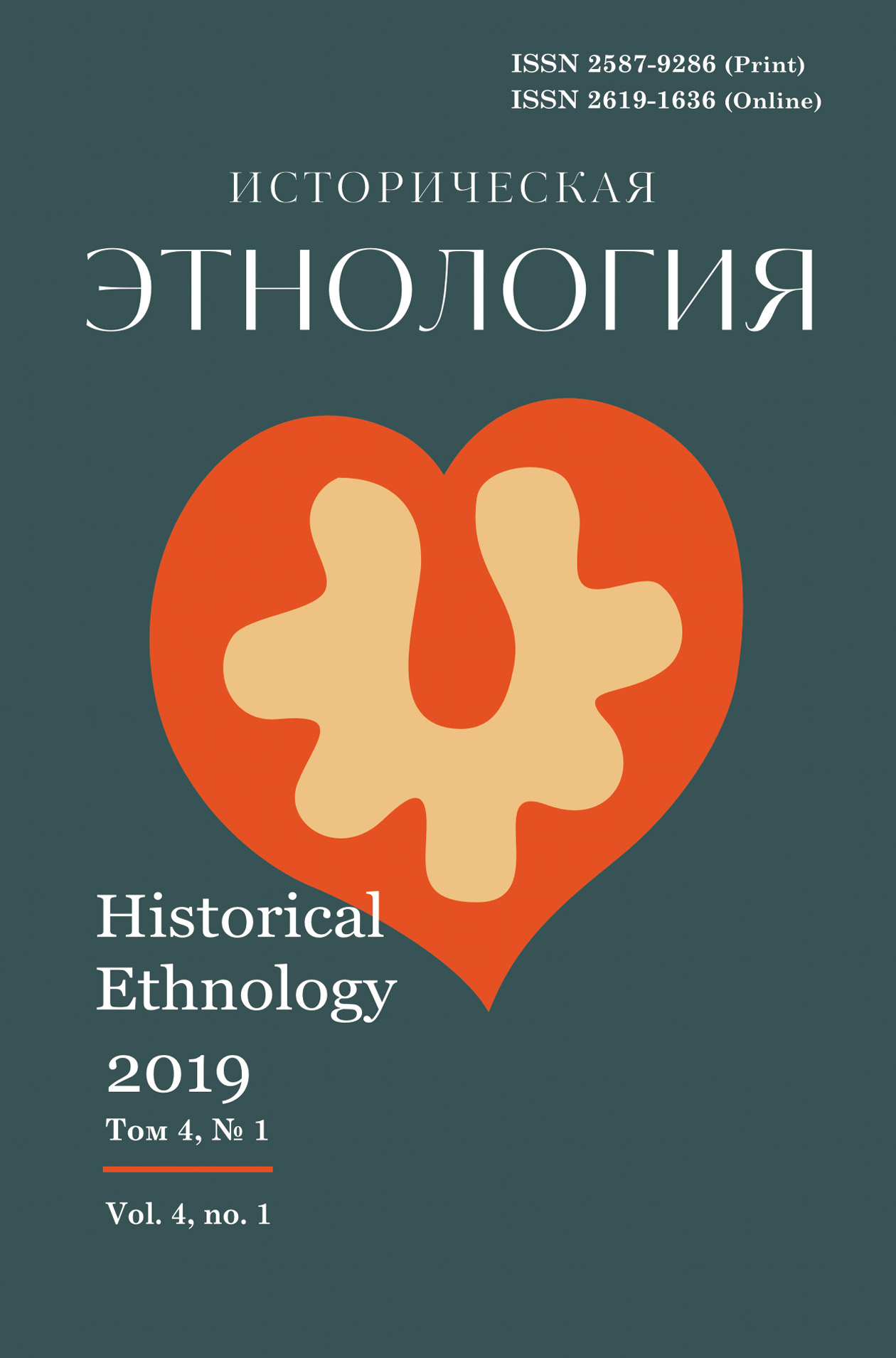Interpretations of Volga Bulgaria in contemporary Bulgarian historiography through the works of Gainetdin Akhmarov.
Stanchev E.G.
65-84 p.
doi.org: 10.22378/he.2019-4-1.65-84
The article focuses on analyzing different interpretations and assessments of the works of the lead Tatar scientist Gainetdin Akhmarov (1864–1911) in contemporary Bulgarian historiography based on translations of some of his texts in the Bulgarian language. His essay History of [Volga] Bulgaria (in Tatar: Bulgar tarikh) (1909) was published in Sofia, Bulgaria in 2002 by Ogledalo Publishing House (which has also published other works on the topic of Volga Bulgaria). The article points at deliberate re-interpretations of G.N. Akhmarov’s original theses made in order to openly correspond with the dominant ideas on Volga Bulgaria that are present in contemporary Bulgarian historiography. This was predominantly imposed on the original text of Akhmarov through a number of commentaries, clarifications and additions by the editorial team and specifically by Tatyana Yarullina. The latter is an author of several popular quasi-historical works on Volga Bulgaria, which are closely related to the ideas of the so called neo-Wäisi movement. Such commentaries not only overexpose Akhmarov’s main thesis concerning the ethnic and historical continuity between Volga Bulgaria and the Kazan Khanate, but they also underscore the teleological fiction of the primordial ethnic relatedness between the Volga Bulghars (and therefore the contemporary Kazan Tatars, perceived as their descendants) and the Bulgarians in the Balkan peninsula. Multiple citations of the historical forgery Djagfar Tarikhy, in the commentaries to the original text are indicative of these manipulations. Despite the fact that it has been largely repudiated internationally by Bulgarian Studies scholars, the fabrication enjoys relative popularity in Bulgaria. The thesis of the present paper suggests that the academic and quasi-academic publications revolving around the history of Volga Bulgaria in present-day Republic of Bulgaria (a prominent example of which is namely this translation of G.N. Akhmarov’s essay) reveal certain tendencies, critical conditions and methodological problems of the Bulgarian historical science in general.
Keywords: Akhmarov G.N., Volga Bulgaria, Neo-Bulgharism, Bulgarian historiography, nationalism, parahistory.
For citation: Stanchev E.G. Interpretations of Volga Bulgaria in contemporary Bulgarian historiography through the works of Gainetdin Akhmarov. Istoricheskaya etnologiya – Historical Ethnology, 2019, vol. 4, no. 1, pp. 65–84. DOI: 10.22378/he.2019-4-1.65-84
REFERENCES
- Akhmerov G. Izbrannye trudy: Istorija Bulgarii. Istorija Kazani. Etnicheskie gruppy i tradicii tatar [Selected works: History of Bulgaria. History of Kazan. Ethnic groups and traditions of the Tatars]. Kazan, Tatar Book Publishing House, 1998. 240 p. (In Russian)
- Akhmerov G. Istoriya na Volzhka Bǎlgariya [The History of Volga Bulgaria]. Sofia, Ogledalo Publishing House, 2002. 96 p. (In Bulgarian)
- Bashtu M. Skazanieto za dǎshteryata na hana. Eposǎt na prabǎlgarite 882 g. [The legend about the khan’s daughter. The epic of Proto-Bulgarians, 882]. Sofia, Agato Publ., 1997. 187 p. (In Bulgarian)
- Bogolyubov A.S. Muftī. Islam: Enciklopedicheskij slovar’ [Islam: An Encyclopedic Dictionary]. Moscow, USSR Academy of Sciences Publ., 1991. 315 p. (In Russian)
- Vasilev V. “Djagfar tarihi” kato izvor za bǎlgarskata istoriya [Djagfar Tarikhy as a source for the Bulgarian history]. Sofia, St. Kliment Ohridski University Press, 2007. 118 p. (In Bulgarian)
- Vladimirov G. Drugata Bǎlgariya na Volga: izgubenata civilizaciya [The other Bulgaria on the Volga: The lost civilization]. Sofia, Svetovna biblioteka, 2009. 80 p. (In Bulgarian)
- Vladimirov G. Dunavska Bǎlgariya i Volzhka Bǎlgariya – formirane i promyana na kulturnite modeli (VII–XI v.) [Danube Bulgaria and Volga Bulgaria – formation and change of the cultural models (7th– 11th)]. Sofia, Orbel Publ., 2005. 158 p. (In Bulgarian)
- Vladimirov G. Kazanskoto hanstvo. Istoriya, ikonomika, kultura [The Kazan Khanate. History, Economics, Culture]. Sofia, Tangra TanNakRa Publ., 2005. 112 p. (In Bulgarian)
- Volodikhin D. Fenomen fol’k-histori [The phenomenon of folk-history]. Otechestvennaja istorija – National History, 2000, no. 4, pp. 16–24. (In Russian)
- Grekov B.D. Volzhskite bǎlgari prez IX–X vek [The Volga Bulghars in the 9th – 10th]. Sofia, Ministry of Information and Arts Publ., 1946. 88 p. (In Bulgarian)
- Daskalov R. Chudniyat svyat na drevnite bǎlgari [The miraculous world of the ancient Bulghars]. Sofia, Gutenberg Publishing House, 2011. 240 p. (In Bulgarian)
- Dobrev P. Drevnostta progovarya. Nov pogled kǎm “Veda Slovena” i “Djagfar-Tarihi [Antiquity begins to speak. A new approach to Veda Slovena and Djagfar Tarikhy]. Sofia, Galik Publishing House, 2007. 195 p. (In Bulgarian)
- Dobrev P. Zlatniyat fond na bǎlgarskata drevnost [The golden fund of Bulgarian antiquity]. Sofia, Tangra TanNakRa Publ., 2006. 890 p. (In Bulgarian)
- Dobrev P. Stopanstvoto i civilizaciyata na Volzhka Bǎlgariya [The agriculture and civilization of Volga Bulgaria]. Sofia, Marin Drinov Academic Publishing House, 2010. 218 p. (In Bulgarian)
- Iliev V. Velika Volzhka Bǎlgariya. Volga – bǎlgarska reka [The Great Volga Bulgaria. The Volga – a Bulgarian river]. Sofia, Komparsita Publ., 1993. 64 p. (In Bulgarian)
- Iman B. Djagfar Svitǎk ot bulgarski letopisi 1680 godina [Djagfar Tarikhy. A corpus of Bulghar chronicles (1680)]. Sofia, Kama Publ., 2005. 340 p. (In Bulgarian)
- Iman B. Djagfar Tom I – Svod Bulgarskikh letopisej 1680 god. [Djagfar Tarikhy. Vol. I – A corpus of Bulghar chronicles (1680)]. Sofia, Ogledalo Publishing House, 2001. 399 p. (In Russian)
- Miyatev P. Bǎlgariya na Volga prez srednite vekove [Bulgaria on the Volga in the Middle Ages]. Prez vekovete. Istoricheski narodopisni i arheologicheski statii [Through the centuries. Historical and archaeological articles]. Sofia, Bulgarian Historical Library, 1938, pp. 126–145. (In Bulgarian)
- Nikolov Al. Paraistoriyata kato fenomen na prehoda: “preotkrivaneto” na drevnite bǎlgari [Parahistory as a phenomenon of transition: the “rediscovery” of the ancient Bulghars]. Istoricheskiyat habitus – opredmetnenata istoriya. Sbornik v chest na 65-godishninata na doc. d-r Rumen Donkov [The historical habitus. A collection in honor of the 65th anniversary of Assoc. Prof. Rumen Donkov, PhD Candidate]. Sofia, Faculty of History, Sofia University “ Kliment Ohridski”, 2013, pp. 24–62. (In Bulgarian)
- Nurutdinov F. My – bulgary [We are Bulghars]. Duel, 1998, № 2. Available at: http://www.duel.ru/199802/?2_4_1 (accessed 06.2016) (In Russian)
- Nurutdinov F. Neskol’ko slov o svode [Some remarks about the corpus]. Djagfar Tom pervyj. Svod Bulgarskikh letopisej 1680 god. [Djagfar Tarikhy. Vol. I – A corpus of Bulghar chronicles (1680)]. Orenburg, Bulgaria newspaper editorial office, 1993, pp. 5–6. (In Russian)
- Pavlov N. Bǎlgarskiyat vǎpros vǎv Volgo-Uralieto (1988–2003) [The Bulgarian question in the Volga-Ural region (1988–2003)]. Sofia, Tangra TanNakRa Publ., 2003. 206 p. (In Bulgarian)
- Petrov A.E. Neobulgarskaja ideja i legitimizacija poddel’nogo svoda Djagfara [The neo-Bulgharist idea and the legitimization of the forged corpus of Djagfar]. Fal’sifikacija istoricheskikh istochnikov i konstruirovanie etnokraticheskikh mifov [The falsification of historical sources and the construction of ethnocratic myths]. Moscow, IA RAS Publ, 2011, pp. 288–296. (In Russian)
- Salakhova, E.K. Dejatel’nost’ G. Akhmarova v Obshchestve arkheologii, istorii i etnografii pri Kazanskom universitete [The activities of G. Akhmarov in the Society of Archaeology, History and Ethnography at Kazan University]. Obshchestvo arkheologii, istorii i etnografii pri Kazanskom universitete – Society of Archaeology, History and Ethnography at Kazan University, 2017, no. 4, pp. 121–133. (In Russian)
- Salakhova, E.K. Problema preemstvennosti Bulgarskogo gosudarstva i Kazanskogo khanstva v trudah G.N. Akhmarova [The problem of continuity between the Bulgarian state and the Khanate of Kazan in the work of G.N. Akhmarov]. Put’ nauki. Mezhdunarodnyj nauchnyj zhurnal – The path of science. International Journal of Science, 2014, no. 3, pp. 33–35. (In Russian)
- Stanchev E. Nacionalizǎm i dinamika na identichnostta na volzhkite tatari (XIX – krayat na XX vek) [Nationalism and dynamics of identity of Volga Tatars (the 19th – late 20th)]. Dr. Hist. sci. diss, Sofia, 2019. (In Bulgarian)
- Fakhrutdinov R.G. Ocherki po istorii Volzhskoj Bulgarii [Essays in the history of Volga Bulgaria]. Moscow, Nauka Publ., 1984. 216 p. (In Russian)
- Frank A. Islamskaja istoriografija i “bulgarskaja” identichnost’ tatar i bashkir v Rossii [Islamic historiography and “Bulghar” identity among the Tatars and Bashkirs of Russia]. Transl. from English Il. Khajbutdinova. Kazan, Russian Islamic University Publ., 2008. 265 p. (In Russian)
- Khalil G. My – bolgary, a ne tatary. Chast’ 2 [We are Bulgars, and not Tatars. 2]. Kazan-Sofia, Ogledalo Publishing House, 2002. 68 p. (In Russian)
- Khalil G., Yarullina T. Kǎde e izcheznala Volzhka Bǎlgariya. Bǎlgarskata dǎrzhavnost na Volga prez XX vek [Where did Volga Bulgaria disappear? The Bulgarian statehood on the Volga in the 20th century]. Sofia, Ogledalo Publishing House, 2003. 82 p. (In Bulgarian)
- Tsonev V. Nepoznatata Volzhka Bǎlgariya [The unknown Volga Bulgaria]. Sofia, Litera Prima Publ., 2007. 144 p. (In Bulgarian)
- Cholov P. Volzhka Bǎlgariya VII – XVI vek [Volga Bulgaria in the 7th–16th – XVI cc.] Sofia, Kama, 2008. 240 p. (In Bulgarian)
- Schamiloglu U. “Djagfar Tarikhy”: kak izobretalos’ bulgarskoe samosoznanie [“Djagfar Tarikhy”: How was Bulgarian consciousness invented?]. Fal’sifikacija istoricheskikh istochnikov i konstruirovanie etnokraticheskikh mifov [The falsification of historical sources and the construction of ethnocratic myths]. Moscow, IA RAS Publ., 2011, pp. 275–287. (In Russian)
- Shnirelman V.A. Ot konfessional’nogo k ehtnicheskomu: bulgarskaya ideya v nacional’nom samosoznanii kazanskih tatar v XX veke [From confessional to ethnic: the Bulgarian idea in the national self-consciousness of the Kazan Tatars in the 20th century]. Vestnik Evrazii – Acta Eurasica, 1998, no. 1–2, pp. 131–152. (In Russian)
- Yarullina T. Alternativni modeli v istoriyata (vǎrhu istoriyata na Volzhska Bǎlgariya ot XV–XVII v.) [Alternative models in history (on the history of Volga Bulgaria in the 15th –17th)]. Avi-tohol, Vol. 37, 2016, pp. 16–36. (In Bulgarian)
- Yarullina T. Velichieto na Volzhka Bǎlgariya [The greatness of Volga Bulgaria]. Sofia, Ogledalo Publishing House, 2002. 93 p. (In Bulgarian)
- Yarullina T. Volzhka Bǎlgariya i Evropa: Istoriko-kulturologichni ocherci [Volga Bulgaria and Europe: historical and culturological essays]. Sofia, Ogledalo Publishing House, 2008. 548 p. (In Bulgarian)
- Barth F. Introduction. Ethnic Groups and Boundaries. The Social Organization of Culture Difference / Ed. by F. Barth. Boston: Little, Brown and Company, 1969, pp. 9–38. (In English)
- Calmard J. Mollā. Encyclopaedia of Islam, Second Edition, Vol. VII, MIF–NAZ / Ed. by C.E. Bosworth et al. Leiden and New York, Brill, 1993, pp. 221–225. (In English)
- Elenkov I., Koleva D. Historiography in Bulgaria After the Fall of Communism: Did “The Change” Happen? Historein, 2003, Vol. 4, pp. 183–198. (In English)
- Friedman V. From Orientalism to Democracy and Back Again. Developing cultural identity in the Balkans. Convergence vs. Divergence / Ed. by R. Detrez, P. Plas. Berlin, PIE-Peter Lang, 2005, pp. 25–43. (In English)
- Geary P. Ethnic Identity as a Situational Construct in the Early Middle Ages. Mitteilungen der anthropologischen Gesellschaft in Wien, 1983, Vol. 113, pp. 15–26. (In English)
- Laruelle M. Religious revival, nationalism and the ‛invention of tradition’: political Tengrism in Central Asia and Tatarstan. Central Asian Survey, 2007, 26 (2), pp.203–216. (In English)
- Özkırımlı U. Theories of Nationalism: A Critical Introduction. 3rd edition. Basingstoke, Hampshire, UK, Palgrave Macmillan, 2017. 256 p. (In English)
- Pohl W. Conceptions of Ethnicity in Early Medieval Studies. Debating the Middle Ages: Issues and Readings / Ed. by L. Little, B. Rosenwein. Oxford, Blackwell Publishers, 1998, pp. 13–24. (In English)
- Shnirelman V. “Christians! Go home”: A Revival of Neo-Paganism between the Baltic Sea and Transcaucasia (An Overview). Journal of Contemporary Religion, 2002, Vol. 17, No. 2, pp. 197–211. (In English)
- Shnirelman V. Who Gets the Past? Competition for Ancestors among Non-Russian Intellectuals in Russia. Washington, The Woodrow Wilson Center Press, 1996. 100 p. (In English)
- Tyan E., Walsh J.R. Fatwā. Encyclopaedia of Islam, Second Edition, Vol. II, C–G / Ed. by B. Lewis, Ch. Pellat, J. Schacht. Leiden, Brill, 1991, pp. 866–867. (InEnglish)
- Zimonyi I. The Origins of the Volga Bulghars. Studia Uralo-Altaica, 1990, 211 p. (In English)
About the author: Evlogi G. Stanchev is a Candidate of Science (History), Research Fellow (Assistant), Department of Early Modern History of the Balkans at Institute of Balkan Studies and Center of Thracology, Bulgarian Academy of Sciences (45, Moskovska St., Sofia 1000, Bulgaria); evlogi.stanchev@gmail.com
|
|








